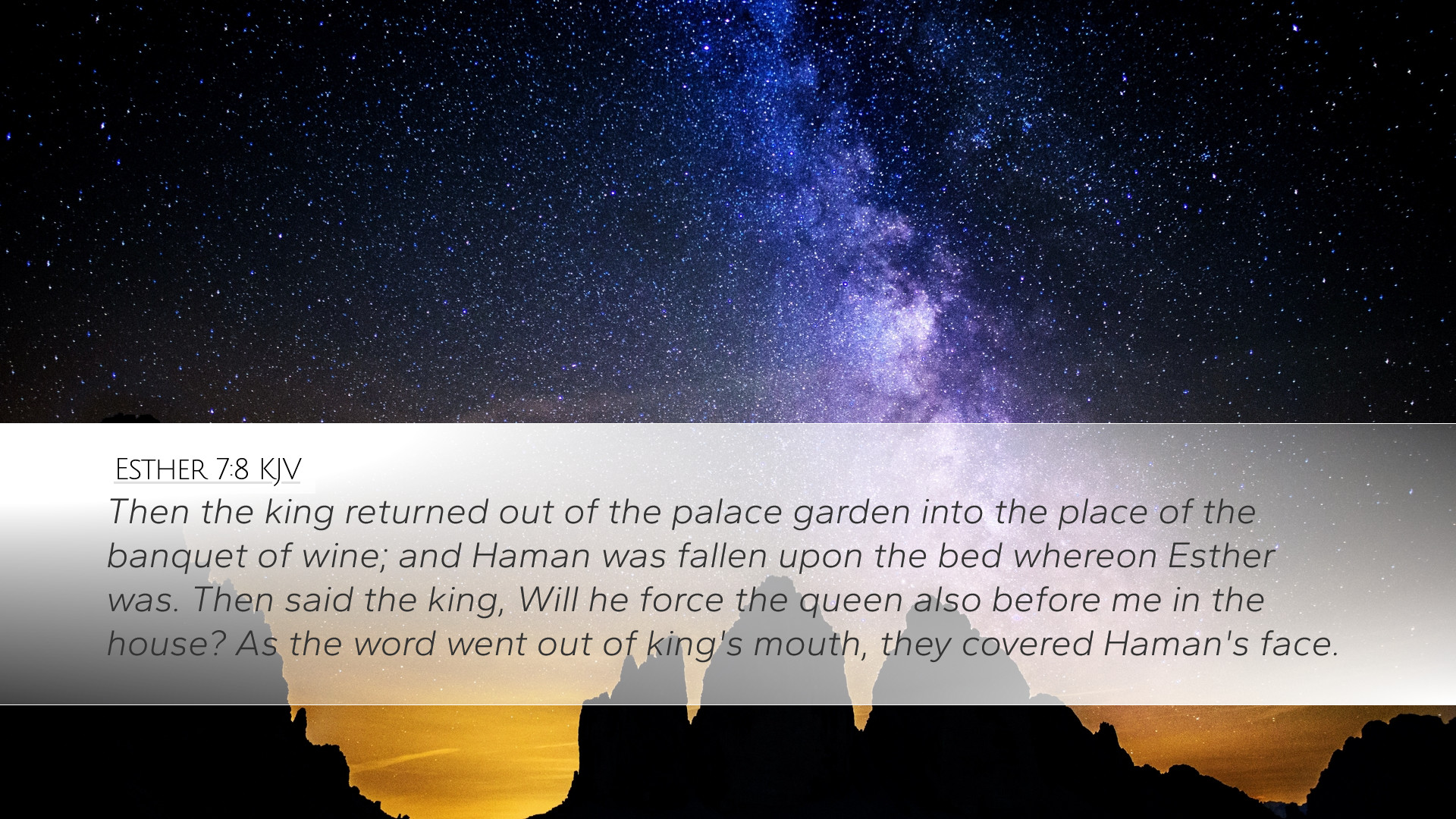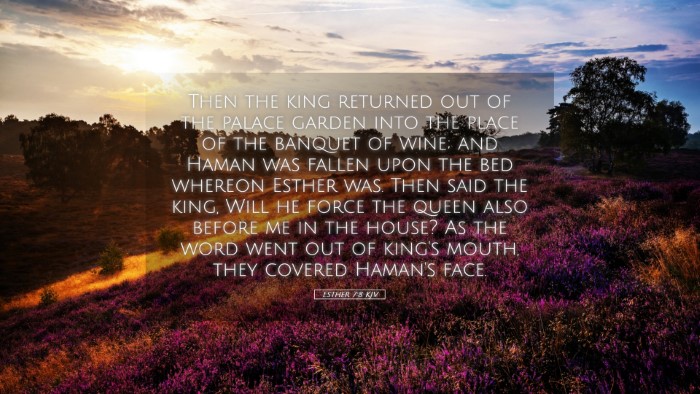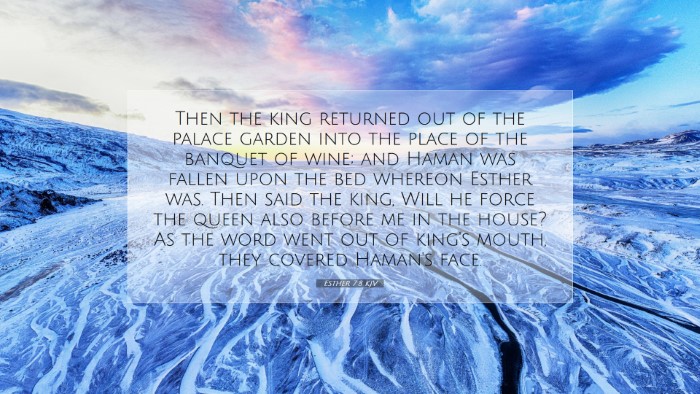Old Testament
Genesis Exodus Leviticus Numbers Deuteronomy Joshua Judges Ruth 1 Samuel 2 Samuel 1 Kings 2 Kings 1 Chronicles 2 Chronicles Ezra Nehemiah Esther Job Psalms Proverbs Ecclesiastes Song of Solomon Isaiah Jeremiah Lamentations Ezekiel Daniel Hosea Joel Amos Obadiah Jonah Micah Nahum Habakkuk Zephaniah Haggai Zechariah MalachiEsther 7:8
Esther 7:8 KJV
Then the king returned out of the palace garden into the place of the banquet of wine; and Haman was fallen upon the bed whereon Esther was. Then said the king, Will he force the queen also before me in the house? As the word went out of king's mouth, they covered Haman's face.
Esther 7:8 Bible Commentary
Commentary on Esther 7:8
Esther 7:8 presents a pivotal moment in the narrative of Esther, where the fate of the Jewish people hangs in balance. It reads:
"And the king arose in his wrath from the banquet of wine, and went into the palace garden: and Haman stood up to make request for his life to Esther the queen; for he saw that there was evil determined against him by the king."
Contextual Background
This verse occurs within the tension-filled events of the Book of Esther, a narrative that highlights themes of providence, identity, and the struggle against tyranny. Haman’s plot against the Jews has come to fruition, and the queen, Esther, has strategically revealed her own identity and the identity of her people to King Ahasuerus. The emotional crescendo reached in this moment serves as a critical turn in the biblical drama.
The King's Anger
Matthew Henry notes that the king's anger signifies both a righteous indignation and a personal betrayal. The wrath of Ahasuerus is directed not only at Haman for his treachery but also at the threat Haman poses to Esther and her kin, whom he has unwittingly come to love:
- Righteous Anger: Henry reflects that the rage of the king serves to demonstrate how God can turn the hearts of rulers to execute justice.
- The Nature of Power: Henry elaborates that earthly power is temporary and can be swiftly turned against those who abuse it, an important reminder for both rulers and subjects of justice.
Haman's Desperation
In contrast, Albert Barnes highlights Haman’s subsequent actions, interpreting them as a desperate plea for mercy:
- Desperate Actions: Barnes describes Haman's plea as a reflection of the severe consequences of sin and pride. His earlier confidence is now transformed into utter fear and vulnerability.
- Request for Life: Haman's request for mercy indicates an understanding of justice; he recognizes that he has overreached and must now face his inevitable judgment.
Esther's Position
Adam Clarke examines Esther’s critical role in this situation. She serves as an advocate for the Jewish people:
- Role of Advocate: Clarke observes that Esther not only identifies with her people but also bravely engages in intercession, a quality that is essential for leaders.
- Diplomatic Skill: Her ability to navigate the complexities of court life while advocating for justice reflects an important principle for those in positions of influence.
Theological Insights
The theological implications of Esther 7:8 resonate deeply. It raises questions about divine providence:
- God's Sovereignty: The apparent chaos of Haman’s plot leads ultimately to God’s purpose being realized, highlighting His sovereignty over human affairs.
- Justice and Retribution: The narrative illustrates the biblical principle of reaping what one sows, an important doctrine that warns against injustice and oppression.
Lessons for Today
For pastors, students, theologians, and scholars, Esther 7:8 offers significant lessons:
- Boldness in Advocacy: Esther’s example prompts believers to stand for truth and justice in difficult circumstances, encouraging them to be bold advocates in their communities.
- Understanding Divine Timing: This story reminds us of God's perfect timing and intervention, reinforcing faith in His overarching plan even amidst dire situations.
- Response to Sin: Haman's downfall serves as a cautionary tale regarding the arrogance of pride and the inevitable judgment that follows.
Conclusion
Esther 7:8 serves as a rich tapestry of emotions, character contrasts, and underlying theological themes. It intricately weaves together the narrative of human frailty with divine providence, ultimately reminding believers of the importance of courage, advocacy, and the reality of justice. Through insightful reflections from Matthew Henry, Albert Barnes, and Adam Clarke, the commentary on this verse deepens one’s understanding of the text and its relevance for faith and practice today.


